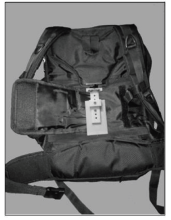Evaluation of school backpack prototype-based on gait parameters, energy expenditure and posture of students
| Abstract | Carrying of backpacks by school going children leads to postural and gait adaptations, leading to falls, imbalances, low back pain and musculoskeletal disorders. This study examined gait parameters, posture and energy expenditure differences between the modified backpack (MBP) and the existing backpacks (EBPs) in school students. Using portable gait system, 26 healthy participants performed the trials with three loading conditions of 10%, 20% and 30% of their body weight (BW) with the two different categories of backpacks. There was significant difference in cadence, double support time, ground impact, energy expenditure and anterior lean angle between no-load condition and the backpacks. Relative to the no-load condition, energy expenditure (EE) increased by 4.26 cal/min, and anterior lean angle (ALA) increased by 6.90° for the EBPs at 30% load condition whereas EE increased by 2.83 calories/min and ALA by 4.43° in case of MBP at 30% condition. The results indicate that parameters recorded while carrying MBP resembled the those recorded during no-load condition. The erect posture, natural gait patterns and reduction in energy consumption supported by the MBP may thus reduce the causes of back pain and fatigue among school children. |
| Faculty |
Prof. Parveen Kalra
|
|
parveenkalra@pec.edu.in
|
|
| Collaborations | NITIE, Mumbai |
| More Information | Doi: 10.18520/cs/v115/i5/930-936 |







